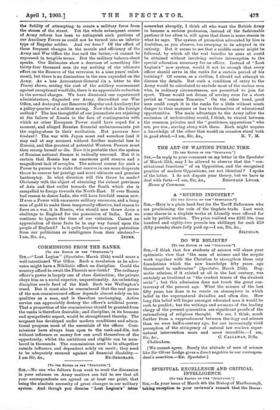SIR,—" Lost Legion" (Spectator, March 25th) would scare a well-intentioned
War Office. Such a revolution as he advo- cates might have a Nihilistic effect on discipline. Could the country afford to await the Phoenix new-birth? The ordinary officer's power is largely one of class distinction; the private obeys him as a social superior, unquestionably. An unbending discipline needs food of the kind. Such was Wellington's creed. But it must also be remembered that the real power of the non-commissioned officer depends almost solely on his qualities as a man, and is therefore unchanging. Active service can appreciably destroy the officer's artificial power. That a proportion of the commissions should be granted from the ranks is therefore desirable; and discipline, in its humane and sympathetic aspect, would be strengthened thereby. The sergeant has developed under modern conditions and educa- tional progress most of the essentials of the officer. Com- missions have always been open to the rank-and-file, but without influence or money few can avail themselves of the opportunity, whilst the ambitious and eligible can be num- bered in thousands. The commissions need to be altogether -outside influence, and dependent solely on merit ; they need to be adequately ensured against all financial disability.— ' I am Sir, &a., EX-SERGEANT.






































 Previous page
Previous page